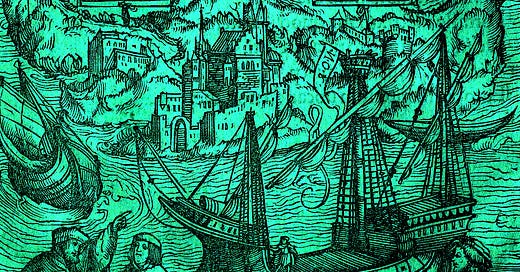Thomas More’s Eugenics
Thomas More, author of Utopia and coiner of the word, was a truly proto-modern thinker. Already, his initial vision of the perfect state in stasis acknowledged the primacy of sexual reproduction: “procreation is a duty which one owes to both nature and to one’s country.”1 The basis of More’s utopian vision is distinctly hymeneal, relying on the social technology of monogamy to assure its stability and continuation.
“Any boy or girl convicted of premarital intercourse is severely punished and permanently disqualified from marrying […] The Utopians are particularly strict about that kind of thing, because they think few people want to get married — which means spending one’s whole life with the same person […] if they weren’t carefully prevented from having any sexual intercourse otherwise.”2
To contemporary ears this description seems awash with outmoded Catholic prohibition. Perhaps if we consider the current sexual economy in comparison More was onto something.
Utopia is murdered violently by sexual selection, yet desires its mechanism to propagate. How can we maintain, let alone approach, any utopia with the excesses and privations insinuated by the sexual system? The organs and libido produced by nature, left to their own devices, leave the Cassanova unsatisfied and the incel on the verge of violence. Unfettered sexual economy transforms women into complicated masturbatory devices through contraception. Utopian liberality stimulates the overproduction of dysgenic matches. Only the unthinking can bare the emotional weight of our apparent proximity to the animals.
‘in moderation’ — There is no such thing for humanity. Have we ever managed ideology, technology or Capital in moderation?
It is for these reasons that a strict monogamous control-system is at the heart of More’s Utopia. He foresaw that utopian conditions would reevaluate the arbitrary values of moderation and temperance. Sensual abundance intoxicates us back into motivations driven by pure desire, we quickly cast aside restrictions imposed by the subordinate intellect. Falling back into those systems regulated by pleasure in the absence of the pain of natural privation or violence.
“The Utopians therefore regard the enjoyment of life - that is pleasure - as the natural object of all human efforts […] it is synonymous with virtuous.”3
For Utopia, liberty is overrated. Without the impositions and moral dictates derived from the accident that is the human intellect we are simply comfort-seeking feedback systems. A feedback loop on these systems is all too easily created with the adequate technical knowledge. Ejaculation connects with satiation and distraction in a circular displacement of experiential time. People develop themselves out of the gene pool and the story is over. Perhaps now, the ideas of the early eugenicists, such as a bachelor tax,4 don’t seem so silly.
More, T. (1988). Utopia. Translated by Turner, P. Penguin Books. p.122
Ibid. p.103
Ibid. p.92
Schuster, E. (1912). Eugenics. p.30-31




